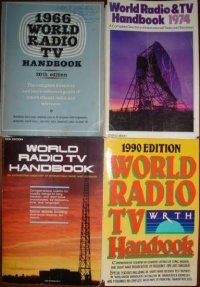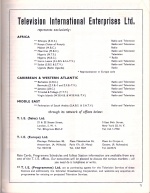WRTH
Contents
WORLD RADIO TV HANDBOOK (WRTH)
The Directory of International Radio & Television
An invaluable resource tool is the World Radio TV Handbook (WRTH), which has been published annually since 1947. The Handbooks contain details on all the radio and television stations around the world. Much of the population, TV systems, channel names and identity detail used in BroaDWcast has been sourced from these guides. While many older books are harder to come by (most major libraries hold only more recent volumes) we have been able to access volumes from the periods when Doctor Who was at the height of its popularity: 1966, 1974, 1979, 1984, 1990.
The WRTHs also contain articles and features of interest; for instance the 1974 edition contains a transcription of an address made on 12 April 1973 by the BBC's Managing Director, Huw Wheldon, in which he extols the virtues of the BBC selling more and more material around the world, the benefits of dubbing (he mentions having seen "Dr Who... in Arabic, and a curious experience it was") and the profits made from worldwide sales.
Other points of note in the 1974 volume:
- In 1962, a few scores of programmes were sold around the world
- By 1972, 1,400 films and tapes were sent out from London every month
- At the same time a further 600 films and tapes were circulating between one country and another
- Turnover of programme sales in 1962 was just under £300,000; turnover in 972 was just over £3 million – an increase by tenfold in as many years
- Dubbing is becoming more common
- More sales have been made to Iran than ever before
- The BBC's main markets were Australia and New Zealand and the United States
- BBC programmes became popular in the United States from 1971, when PBS and other non-commercial stations began looking elsewhere for quality programming, and turned to the BBC because of its reputation
- The BBC's deal with Time-Life to act as distributor in the US
- The BBC sells to over 100 countries
- Much of the revenue taken from foreign sales goes to the authors and actors and artists, with "modest amounts" going to the BBC
- The cost to buy a series can be £600 for one country, but a much as £60,000 for another, even before any profit is made
WRTH Sites
TELEVISION INTERNATIONAL ENTERPRISES LTD (TIE Ltd)
The WRTHs also contain advertising, some of which reveal fascinating details such as in this full-page advertisement from the 1966 volume for Television International Enterprises Ltd.
TIE Ltd and its subsidiary T.I.E. (Programmes) Ltd and other network companies would have been responsible for purchasing Doctor Who from the BBC and distributing film prints to those countries for which it was an agent.
On the unsupported assumption that TIE circulated one set of prints within each region or continent, the following might represent the order in which the prints were circulated from country to country:
Of course, there's no certainty that films were always circulated in this manner. Given that there isn't any cross-over of the airdates within each territory, and in most cases the gap between screenings is usually only matter of a few weeks apart - which is plenty of time for the films to be shipped between countries to meet the known airdates – there is good reason to assume there was indeed movement of the same sets of prints between some of these eleven countries in the mid-to-late 1960s.
Oh, and before anyone asks, TIE Ltd no longer exists – we've checked - so there's little chance of there still being a long lost film store containing copies of Marco Polo beneath Sloane Street!

